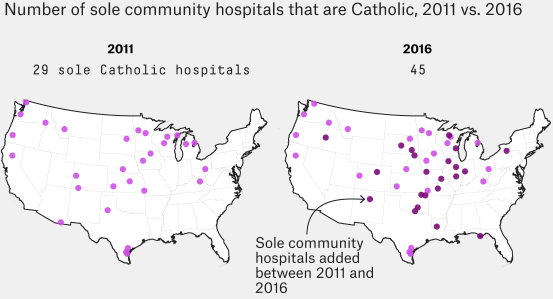"In a growing number of communities around the country, especially in rural areas, patients and physicians have access to just one hospital. And in more and more places, that hospital is Catholic," Anna Maria Barry-Jester and Amelia Thomson-DeVeaux report for FiveThirtyEight. "That sounds innocuous — a hospital is a hospital, after all. But Catholic hospitals are bound by a range of restrictions on care that are determined by religious authorities, with very little input from medical staff. Increasingly, where a patient lives can determine whether Catholic doctrine, and how the local bishop interprets that doctrine, will decide what kind of care she can get."
Commonly affected services include abortion, birth control, some end-of-life care, and gender-affirmation procedures. Some doctors who had worked at Catholic hospitals told the reporters that they had been unable to give what they felt was the most effective treatment to some patients because of religious restrictions. Some low-income women are not able to go elsewhere for services not provided by Catholic hospitals, due to financial and transportation challenges.
Catholic hospitals have had some latitude to deny certain treatment options for decades, but that power has been expanded under recent moves by the Trump administration. President Trump signed an executive order saying his administration would protect religious freedom, then the Department of Health and Human Services ruled that large employers don't have to cover birth control for employees. HHS also created a Conscience and Religious Freedom Division to focus on protecting employers' rights.
Nationwide, "best estimates suggest that one in six hospital beds and many of the nation’s largest nonprofit health systems are Catholic-owned or -affiliated," Barry-Jester and Thomson-DeVeaux report. "From 2001 to 2016, the number of Catholic-affiliated hospitals in the U.S. grew by 22 percent, even as the total number of hospitals in the U.S. shrunk, according to research by MergerWatch and the American Civil Liberties Union. And the changes vary by region. In Washington state, more than 40 percent of hospital beds are in Catholic institutions. In several Midwestern states, more than 30 percent of beds are in Catholic hospitals.
This is partly because Catholic hospitals may be able to weather financial hardship better because of their nonprofit status, efficiency, and access to Catholic church funding.

No comments:
Post a Comment